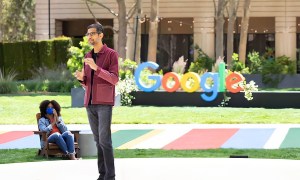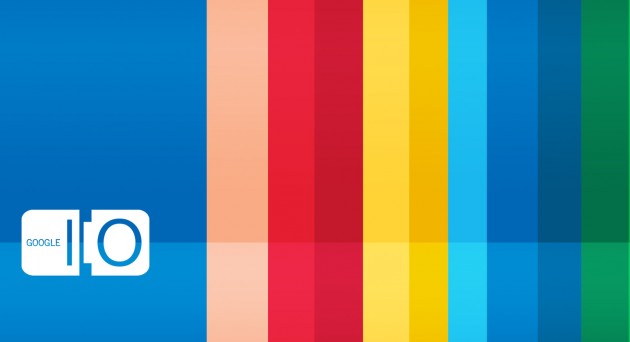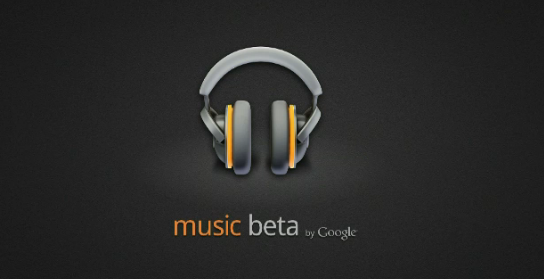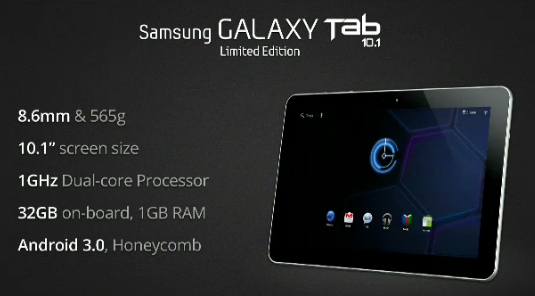

- As of today, more than 100 million Android devices have been activated worldwide.
- There are more than 310 Android devices available in 112 countries.
- At last year’s Google I/O conference, Google announced it was activating 100,000 Android devices every day. Today that number has reached 400,000.
- There are over 200,000 apps in Android Market.
Undoubtedly impressive for the young mobile OS, but this was easily overshadowed by what followed.
Honeycomb 3.1
Starting today, the next version of Honeycomb will start rolling out to Verizon 3G Xooms, addressing a variety of users’ early issues with the operating system. Most noticeably, Honeycomb 3.1 will expand the task switcher to include more apps than simply what fits the frame. Users will now be able to paw through all their most recent tasks and opened apps, and a “unique technology” will shut down programs to save battery but keep their screenshots in the task switcher to easily, quickly resume progress.
Widgets can also now be expanded horizontally and vertically, versus stuck in the offensively small box they are now. Gmail addicts will appreciate the ability to now have first-glance access to more than the first four e-mails of their inboxes.
The Android team has also upgraded its USB support. Android devices can act as USB hosts, and demonstrators showed off how you can now use your Xbox 360 controller to play games on the tablet.
The OS upgrade isn’t only coming to a Xoom near you: Google TV devices will be getting Honeycomb 3.1 this summer, along with the Android Market. Developers will get the SDK in the near future and the update will go out over the air.
 Ice Cream Sandwich
Ice Cream Sandwich
In other OS announcements, Android finally officially announced its next mobile smartphone system, Ice Cream Sandwich (nope, not Ice Cream). Ice Cream Sandwich is targeted for a fourth-quarter launch and will be offered on a variety of phones and tablets, including the Xperia Play. Of course, when announcing dual operating systems, Android has to addresses that whole “fragmented” thing. Barra asserted that “we want one OS that runs everywhere,” saying Android wants to take all of the benefits of Honeycomb (richer widgets, advanced apps, holographic UI) and make them available across the platform.
The one small demo of software to come was the virtual camera operator. The new technology means that when using video chat with more than one person, your device will detect who is speaking and zoom in on the speaker.
Music beta by Google

The UI is reminiscent of iTunes (what music service isn’t?), and includes similar features like the I/O Jams playlist feature (much like iTunes Smart playlist) and Instant Mix, which creates a playlist based off one song selection and which Joyce cleverly called “a truly ingenious mix” (you hear that backhanded slight, Apple?).
Making the transition from your current music library setup to Google’s is the ability to directly import your entire WMP or iTunes collections, which will include ratings, album artwork, and the like.
It all looks fairly competitive and infinitely easy to use, but Google didn’t even touch the fact that it has no agreements with record companies, only mentioning it currently has 20,000 songs in its library. Hey, at least it officially beat Apple to the announcement punch.
Android to the cloud
Music beta by Google isn’t the only cloud solution the company’s been working on. Android announced it has updated its movie and music apps. Likely in light of YouTube’s announcement yesterday, Android devices will now have the privilege of selecting films from the hugely expanded library. In addition to streaming content directly on a phone or tablet, users can also pin movies to the background of the device for offline viewing. The new movie app will roll out to all Android 2.2 and later devices in a few weeks.
The music app will soon be able to connect to the cloud-music service for updating purposes, and your created playlists will automatically be available. If you’re working offline, the app will cache recently played tunes for easy access. The pinning service, as with movies, is also available. The music app will begin rolling out today.
Addressing issues
Google also talked about righting some wrongs with Android. This past year has been full of updates gone wrong, and left far too many users stuck in Froyo limbo. Barra says Google has created a team that will address how it will implement updates, how customers will get the updates in a timely manner, and how quickly devices are updated after upgrades are released. Members of this team include Verizon, HTC, Sony Ericsson, T-Mobile, AT&T, Motorola, LG, Vodafone, Sprint, and that notorious offender Samsung.
Android will also extend is openness with “Android open accessory,” adding platform support for hardware accessories and a new API that will work with any Android device going forward.
Android@Home

In more practical possibilities, Google announced it is partnering with Lighting Science to release LED lightbulbs and switches that will connect to Android devices for easy on and off powering. They should be available by the end of the year.
We also got a quick glimpse of the Samsung Galaxy Tab 10.1, which everyone in the audience was lucky enough to take home.




